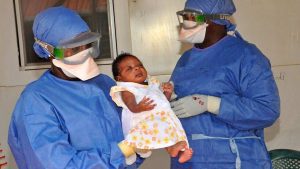 The World Health Organization (WHO) has declared Guinea free of Ebola after successfully controlling a deadly outbreak that began in February 2021. The announcement comes after the country reported no new cases for 42 consecutive days, a critical milestone in declaring the end of an Ebola outbreak. The virus, which claimed 12 lives, triggered swift responses from both national and international health agencies.
The World Health Organization (WHO) has declared Guinea free of Ebola after successfully controlling a deadly outbreak that began in February 2021. The announcement comes after the country reported no new cases for 42 consecutive days, a critical milestone in declaring the end of an Ebola outbreak. The virus, which claimed 12 lives, triggered swift responses from both national and international health agencies.
The outbreak, which emerged in the southeastern region of Nzérékoré, marked Guinea’s first resurgence of Ebola since the devastating West Africa outbreak from 2014-2016, which claimed over 11,000 lives. Authorities acted quickly, deploying emergency response teams to contain the spread of the virus.
WHO and Guinea’s Ministry of Health, alongside partners such as the International Federation of Red Cross and Doctors Without Borders (MSF), worked closely to deploy vaccines, establish treatment centers, and trace contacts. Over 10,000 people were vaccinated using an experimental Ebola vaccine, which was instrumental in controlling the virus. The ring vaccination strategy focused on vaccinating individuals who had come into contact with confirmed cases and their contacts, significantly reducing the risk of wider transmission.
Dr. Matshidiso Moeti, WHO Regional Director for Africa, commended the efforts of Guinea’s health workers and the support from international partners. “This is a testament to the resilience and vigilance of Guinea’s health system and its people. However, the threat of Ebola remains, and we must continue strengthening health infrastructure to prevent future outbreaks,” she stated.
Though the outbreak has been declared over, WHO officials remain cautious, emphasizing the need for continued vigilance. Survivors of Ebola can sometimes carry the virus in bodily fluids long after recovery, posing a risk of re-emergence. Guinea will continue to monitor the situation closely for the next 90 days to ensure no further cases develop.
This declaration is a significant milestone in the global effort to control Ebola. However, experts warn that the virus can still pose a threat in other parts of the region, and preparedness remains essential.
The swift response to this outbreak highlights the improvements made in Ebola response since the catastrophic outbreak of 2014-2016, offering hope for more effective management of future public health crises.



















